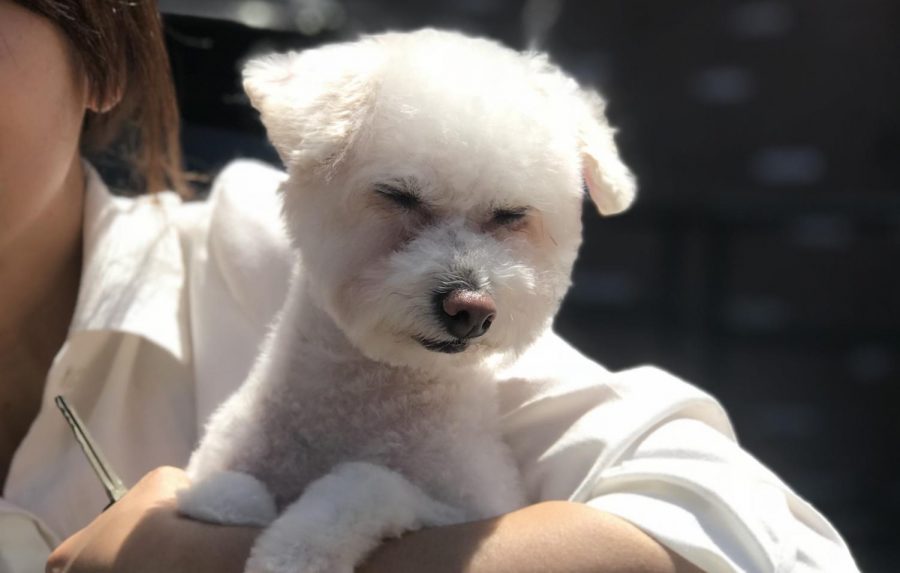Why Do We Talk to Our Pets?
May 1, 2020
Despite the tiny embarrassment coming my way, I will not lie: I talk to my dog all the time. She’s a tiny white toy poodle whose sole entertainments in life are eating and ignoring me. Especially during the quarantine, I find myself talking a lot to her while she stares at me as if I were a pest unworthy of her time. I talk to her about anything: how I feel, how my day went, and whether I prefer the sour cream or the nacho cheese flavored chips. Suddenly, a few days ago, I had a moment of realization. Why am I talking to a creature that is unable to understand anything I am talking about and unable to reply back?
There is actually a professional name for this area of study: anthrozoology. It deals with interactions between humans and animals. Hal Herzog, anthrozoologist and professor of psychology at the University of Western Carolina, says that talking to our pets is totally natural (Thank god – my mom already thinks I’m going crazy.) When people talk to their pets, the pet tends to be a dog, probably because of the natural bond between humans and dogs that has existed during our long history and the therapeutic effect that dogs can have. He also said that we usually speak in short and simple sentences, which seems pretty accurate. I’ve never thought about it before, but when I talk to her, it’s usually a greeting or a closed question and nothing longer.
I also find my voice going much higher than it usually does when I talk to my dog. I can’t really imagine talking to her like she is a real human being. I searched it up on Elite Daily, and I found out that I am also not the only one who does this. Apparently, this is similar to how we talk to babies. Baby talk is a natural instinct of ours that comes from the want to connect with a baby on a deeper level. We use this sort of speech because “usually babies react well to it and some pets may as well.” According to Beverly B. Palmer, from the psychology department at California State University, “Like a human baby, our pet needs to be protected, is dependent, and fulfills our need to be needed, which is equated with being loved.” Another reason why we might talk to our pets in this manner is because we feel like dogs are little humans. I relate a lot to this, because my dog really just reminds me of a tiny baby. She does have a constant sneer and a look of “I’m better than you,” but I get a feeling that she’s a fragile one and has to be treated carefully.
I think that another big factor about my conversations with my dog are my languages. I speak Korean and French other than English, which all sound very different. I speak them about the same, so I keep switching them around on a daily basis. My parents only talk to my dog in Korean, though, so my dog only gives me any sign of recognition when she hears Korean. For example, if I tell her “sit” in Korean (the one and only trick she knows), then she sits down somewhat reluctantly. However, when I tell her the same thing in English, she straight-up ignores it. I believe it’s because Korean is the language she hears the most, but it’s interesting to know that she recognizes a certain language in particular. There actually is evidence that suggests that dogs process language similarly to humans. According to a study by Hungary’s Family Dog Project, it was concluded that it was “tricky” to say dogs understand language, but they can at least recognize some of it. It’s pretty cool to find out that dogs register and remember the types of sounds they hear.
Talking to dogs can also have human benefits. After all, won’t that be why we subconsciously do it? I honestly think that talking to my dog has helped me with my mental health. Lazily rubbing her stomach while lying to her that she looks like a goddess when she really looks like an ungroomed ball of fur can be therapeutic in a way. I’m an only child, and especially during the quarantine, there aren’t as many people to talk to. Dogs are a great alternative, especially because words are not needed to communicate with them. In my opinion, interactions between humans and dogs are based on emotion, the pitch of the voice, and facial features. I believe it relieves the pressure of having a full, logical conversation. (After all, who likes those?)
Even if it’s not a dog, talk to any pet you have; you have absolutely nothing to do anyway. Go ahead and make conversation with your cat, rabbit, hamster, guinea pig, iguana, or pet rat. Personally, I’m pretty sure my dog despises me; when I sit next to her on a couch, she jumps to another one. When I talk to her, she looks away. When I take her on walks, she resists following me and sits on the grass. It’s okay. I’m used to the pain. The rare times that she bestows upon me the blessing to get close are times when I find the small calm spots of my day. After all, the adage about how dogs are a person’s best friend didn’t come out of nowhere.

















































































































































